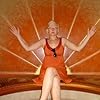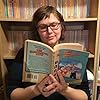To answer questions about
The Haunting of Hill House,
please sign up.
Robyn Copley-Hirst
For me, yes.
More than that, I would say the novel only makes complete sense in that light. The most terrifying thing in the book is the traditional family structure. Anyone who does not fit into this has no place to belong.
We have these echoes of women who have no place in the world. They do not fit into the traditional family. The 'companion' of the previous lady of Hill House who had been hated to death by the family and had finally committed suicide. To me that read as a gay woman who the family could not accept had been left the house in the will. She's one of the first omens that there is no place for lesbians in society at this time.
We've then got Theodora. She and her 'room mate' are on a break. And this offers Eleanor the hope that there might be a family she can fit into: one with Theo.
I understand why some straight people might think that Eleanors revulsion at Theo's touch means she's not gay, but accepting something society tells you is repulsive is very complicated process, even today. Back then this absolutely would be typical for a lot of gay people with these feelings.
There's also that really interesting moment. Both women know they are about to ask the question: do you love me? This hope for a relationship is squashed not by some terrifying monster but by a vision of a traditional family picnic.
It's the traditional family that leaves no space for gay women... and in fact the family, for me, is the true haunting for all of the main characters.
Throw in those 'wink wink' moments: the holding eachother in bed, wondering whether to wear trousers, and only showing you have trousers when the other woman admits she does (this is code that still goes on today; revealing your hidden identity in small ways and fashions). I could go on about this book for days...
But, at the end of the book, Eleanor kills herself because she realises there is no place for her in a family. The odd family they've created at Hill House is coming to an end, her own family don't even have a bedroom or real bed for her to go back to, and finally Theo says that she will not allow Eleanor to live with her,
That's the killer, she's risked it all and been told no, Theo is going back to her girlfriend (sorry, room mate!). And this is as close as the publishers would have allowed Jackson to go at this time. This is the moment she decides to kill herself, just as the previous 'companion' had done at Hill House.
If the book had been any more obvious it would have been banned, or never published in the first place.
More than that, I would say the novel only makes complete sense in that light. The most terrifying thing in the book is the traditional family structure. Anyone who does not fit into this has no place to belong.
We have these echoes of women who have no place in the world. They do not fit into the traditional family. The 'companion' of the previous lady of Hill House who had been hated to death by the family and had finally committed suicide. To me that read as a gay woman who the family could not accept had been left the house in the will. She's one of the first omens that there is no place for lesbians in society at this time.
We've then got Theodora. She and her 'room mate' are on a break. And this offers Eleanor the hope that there might be a family she can fit into: one with Theo.
I understand why some straight people might think that Eleanors revulsion at Theo's touch means she's not gay, but accepting something society tells you is repulsive is very complicated process, even today. Back then this absolutely would be typical for a lot of gay people with these feelings.
There's also that really interesting moment. Both women know they are about to ask the question: do you love me? This hope for a relationship is squashed not by some terrifying monster but by a vision of a traditional family picnic.
It's the traditional family that leaves no space for gay women... and in fact the family, for me, is the true haunting for all of the main characters.
Throw in those 'wink wink' moments: the holding eachother in bed, wondering whether to wear trousers, and only showing you have trousers when the other woman admits she does (this is code that still goes on today; revealing your hidden identity in small ways and fashions). I could go on about this book for days...
But, at the end of the book, Eleanor kills herself because she realises there is no place for her in a family. The odd family they've created at Hill House is coming to an end, her own family don't even have a bedroom or real bed for her to go back to, and finally Theo says that she will not allow Eleanor to live with her,
That's the killer, she's risked it all and been told no, Theo is going back to her girlfriend (sorry, room mate!). And this is as close as the publishers would have allowed Jackson to go at this time. This is the moment she decides to kill herself, just as the previous 'companion' had done at Hill House.
If the book had been any more obvious it would have been banned, or never published in the first place.
FIND ME ON STORYGRAPH
This answer contains spoilers…
(view spoiler)
NekroRider
This answer contains spoilers…
(view spoiler)
Gale Hutchinson
This answer contains spoilers…
(view spoiler)
Alma
I myself was on the fence about that, though I do see what you mean. Eleanor made lots of references to having a boyfriend, or envisioning herself with a guy eventually (the way she'd always tell herself 'journeys end in lovers meeting'). I think she seemed to have ambivalent feelings about Theodora which would vacillate between great admiration and great disgust. I think too Theodora represented a kind of liveliness and freedom of expression that Eleanor forbade in herself, so possibly this too explains her complex reaction to Theodora. I myself was not sure what to make of Eleanor in terms of her romantic or sexual identity, since most of her interactions with people seemed awkward and naive. She also had a habit of coming close to people and then pushing them away, such as how she'd shrink away from Theodora's physical affection, or how Luke would try to be charming and make her laugh and then she'd privately castigate him in her thoughts and write him off as selfish and too simple. I think the overall 'horror' of the novel is actually Eleanor's lack of overall identity, as she seems to be someone who is very unaware of herself or her surroundings, and has little self worth or grip on reality.
Lindsey Lewis
As I was reading this, from the first interaction between Nell and Theo, I said out loud "they're lesbians" and "they gay" almost every single page (my roommate was pretty exhausted by my excited squealing by the end). I mean, come on, they are 30 year old women holding hands and skipping through a field of flowers, Theo has a "roommate," Nell gets extremely jealous of Theo's friendship with Luke, and at one point in the book they are both wanting to say "do you love me?" When she added Luke into the equation, I was beginning to think "wow, they are not just gay they are poly!" (Side note, the 1999 film The Haunting portrays Theo as an openly bisexual and polyamorous woman when she says to Nell "my girlfriend doesn't think I have commitment issues, but my boyfriend does").
I definitely think that repressed sexuality and gender is a theme here because Nell has no experience at all with men or women and it is clear she has some reservations about falling for Theo. She is nervous and unsure of everything she does, and doesn't seem to even know who she is in general. She repetitively hums the song about journeys end in lover's meeting, and has very short-lived fantasies about marrying men, but they feel forced and childish, like she knows what is expected of her. It's clear from how negative she is toward herself that she has internalized a lot of gender roles and because she didn't fit into that mold, she feels like she is not normal or good. She is also clearly immature and at times an insufferable brat, which I kind of feel may be tied to how she was treated by her sister and being forced to care for her mother rather than developing her own personality and character.
However, I've also heard that much of Jackson's work has some lesbian undertones to it, which is pretty amazing given when this was written. And she doesn't seem to sexualize it or condemn it, either. It's just a sweet relationship that brings what little light in their experience into sharp contrast with the evil that is occurring around them. It shows how the house warps them from being sweet and affectionate into hostile toward each other.
I definitely think that repressed sexuality and gender is a theme here because Nell has no experience at all with men or women and it is clear she has some reservations about falling for Theo. She is nervous and unsure of everything she does, and doesn't seem to even know who she is in general. She repetitively hums the song about journeys end in lover's meeting, and has very short-lived fantasies about marrying men, but they feel forced and childish, like she knows what is expected of her. It's clear from how negative she is toward herself that she has internalized a lot of gender roles and because she didn't fit into that mold, she feels like she is not normal or good. She is also clearly immature and at times an insufferable brat, which I kind of feel may be tied to how she was treated by her sister and being forced to care for her mother rather than developing her own personality and character.
However, I've also heard that much of Jackson's work has some lesbian undertones to it, which is pretty amazing given when this was written. And she doesn't seem to sexualize it or condemn it, either. It's just a sweet relationship that brings what little light in their experience into sharp contrast with the evil that is occurring around them. It shows how the house warps them from being sweet and affectionate into hostile toward each other.
Nancy
The horror seemed repressed life, a woman who has really lost her life after childhood. Sexuality is certainly a key part of adult life, but female sexuality is not equivalent to a lesbian identity.
Rob McGrory
Possibly...although I'm gonna toss this into the cereal: Mrs. Montague and Arthur were totally having an affair.
Jeanne Grunert
The author (Shirley Jackson) had been asked this question during her lifetime, and she responded similarly to the way Nancy explains it - it is about feeling closed in about your life and repressed in all ways, not just sexuality. Thea is purposely left ambiguous; she may be lesbian, since the gender of her partner is never revealed, which struck me as unusual.
C'lestial
I personally don't think so. Eleanor, was a very repressed person and lived mostly in a fantasy world created in her mind. Her life appeared to be strictly sheltered from reality, as she took care of her mother for years until the one night Eleanor decided not to get up and her mother died. I think that tended to send her even farther down the hole of being mentally/emotionally imbalanced, along with afterwards, having to live with family who used her and didn't care for her. Eleanor spent so much time coping by living in her imaginary world in her mind, she had no idea what actual reality and dealing with real people and situations were. Once she came to Hill House, she found she had a hard time relating; going back & forth between her self made reality to what was actually going on. Theodora appeared to me as most likely lesbian or bi, but Eleanor didn't really know one way or the other what she was. More likely she looked at Theo as someone to protect her and be her friend, which many women prefer another woman's company for comfort and understanding than a man. It doesn't state whether Eleanor had any kind of relations with any man in her past, so of course she'd probably be a little gun shy around Luke. I think this story was more of the horror of a woman who was not emotionally equipped to exist in the real world at that time in her life. And between this and the experiences she had at Hill House just sent her all the way into insanity.
Yesenia
Shirley Jackson was utterly shocked when some of her works were interpreted along this line--her amazing biography, written by Ruth Franklin, reveals how important friendship was for her, particularly because, sadly, she did not have a lifelong female friend, had no female friend growing up that she would keep... and her mother was so horrible to her, so demeaning, so hateful, that Shirley Jackson did not even get that primordial relationship to give her comfort.
I think that lesbianism/female sexuality is sometimes read onto things that in fact speak of the longing for a true, close, lifelong friend, which is, in my view, an even more profound human need than sex--profound, becuase a true friend can make a life worth living. And sex, you can just have.
I think friendship and closeness and intimacy are too often conflated with sex. And it seems, from Shirley Jackson's own life and experience, that many of her books, the need and repressed desire, was precisely for those elements.
But, that is just me, a person who has not one, but several life-long female friends without whom... I cannot fathom what my life would have been like, if I had not had a friend in each and every stage... my sexual/romantic partners came and went, then I married and had a child--but my child will grow up and leave, and my husband, well, what's a husband? My friends--they are the backbone, the true foundations, of my life. And I really got the vibe, from S. Jackon's biography, that she wished to have such a foundation, such relationships, such love. Sex is overrated...
I think that lesbianism/female sexuality is sometimes read onto things that in fact speak of the longing for a true, close, lifelong friend, which is, in my view, an even more profound human need than sex--profound, becuase a true friend can make a life worth living. And sex, you can just have.
I think friendship and closeness and intimacy are too often conflated with sex. And it seems, from Shirley Jackson's own life and experience, that many of her books, the need and repressed desire, was precisely for those elements.
But, that is just me, a person who has not one, but several life-long female friends without whom... I cannot fathom what my life would have been like, if I had not had a friend in each and every stage... my sexual/romantic partners came and went, then I married and had a child--but my child will grow up and leave, and my husband, well, what's a husband? My friends--they are the backbone, the true foundations, of my life. And I really got the vibe, from S. Jackon's biography, that she wished to have such a foundation, such relationships, such love. Sex is overrated...
Donna From
I thought about the possible lesbian connection several times throughout the reading of the novel. My final take on it was that Eleanor was so unloved, that she reached out for love and attention from anyone who was willing to notice her or favor her with a smile or a kind comment.
As for Eleanor and Theodora, between the two, if I were giving odds on which woman was the repressed lesbian, I would most certainly put my money on Theodora, rather than on Eleanor. Theodora had a "roommate", but she never discussed any of the characteristics of this person, so the reader was left wondering if the roommate was male or female.
As for Eleanor and Theodora, between the two, if I were giving odds on which woman was the repressed lesbian, I would most certainly put my money on Theodora, rather than on Eleanor. Theodora had a "roommate", but she never discussed any of the characteristics of this person, so the reader was left wondering if the roommate was male or female.
Stephen
Eleanor seems to have an attraction to both Luke and Theodora. I think she is just sheltered and does not know how to deal with new experiences.
Dany Salvatierra
Definitely! Eleanor developed a sexual attraction toward Theodora. And Theodora was clever enough to figure that out at several passages of the novel.
Abi
I think it is more female repression in general; thoughts, feelings, reactions, how these are treated by society.
Chloe
I read and reread this so many times years ago. I suspect there was some kind of attraction but I also suspect that Nancy Sculerati nails it with the words "repressed life" and other points she makes. This book never gets old to me - nor does the Lottery. Jackson was a superb writer
B
This answer contains spoilers…
(view spoiler)
Tjdear1gmail.Com
This answer contains spoilers…
(view spoiler)
John
I wouldn't call it horror, but clearly it wasn't necessary for Jackson to portray her characters that way in terms of the story arc or their relationship. They could have become enemies or friends without adding those nuances. So I think that the reader has enough indicators to believe it was more than friendship and that there was a unrequited sexual element, regardless of the sheltered life Eleanor may have lived in the past or even what the author may have consciously intended. Authors reveal more than they intend or know.
Hunter Camp
I’m reading it now, and that’s one hundred percent how I’m reading it.
Liza
I was thinking the same thing! Very interesting. Also repressed sexuality in general.
An Imaginary Cat
Considering half the book is about how awesomely cool Theo looks, I'd say it's heavily implied -- plus it's mentioned Theo lives with a girl, and kind of heavily implied that they're far more than "friends".
Mark Stahl
I definitely picked up on something vaguely homoerotic going on between Nell and Theo. Conventional wisdom, however, makes me think "1959 publishing date? Nah..." I think you might be onto something here.
DM
I didn't think of it as horror, but it was a prominent theme, so it could be. I took the horror to be her own self-consciousness and how she was always judging herself and others to the point that it overwhelmed her. I can see your interpretation, though, that part of her is urging her to "come home" or embrace her sexuality, or alternatively, telling her to return to her prior life before this part of her was revealed. If that is the case, what do you make of the ending of the book, and what do you make of the fact that she can sense everything that happens inside the house?
Moe
Yes, definitely! It's so blatant
Marisa
It absolutely is there as subtext throughout this novel. At the time this was published homosexuality was characterized as a mental illness, so some of Eleanor's unraveling comes from her jealousy of Luke's attraction to Theodora.
SummerLily
Huh, that's an interesting question! While I definitely picked up on some gay subtext, I haven't really thought of it that way... What exactly do you mean?
About Goodreads Q&A
Ask and answer questions about books!
You can pose questions to the Goodreads community with Reader Q&A, or ask your favorite author a question with Ask the Author.
See Featured Authors Answering Questions
Learn more


























